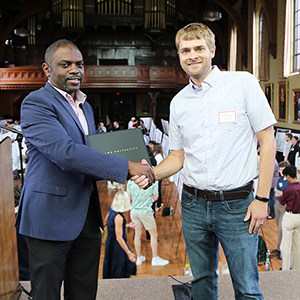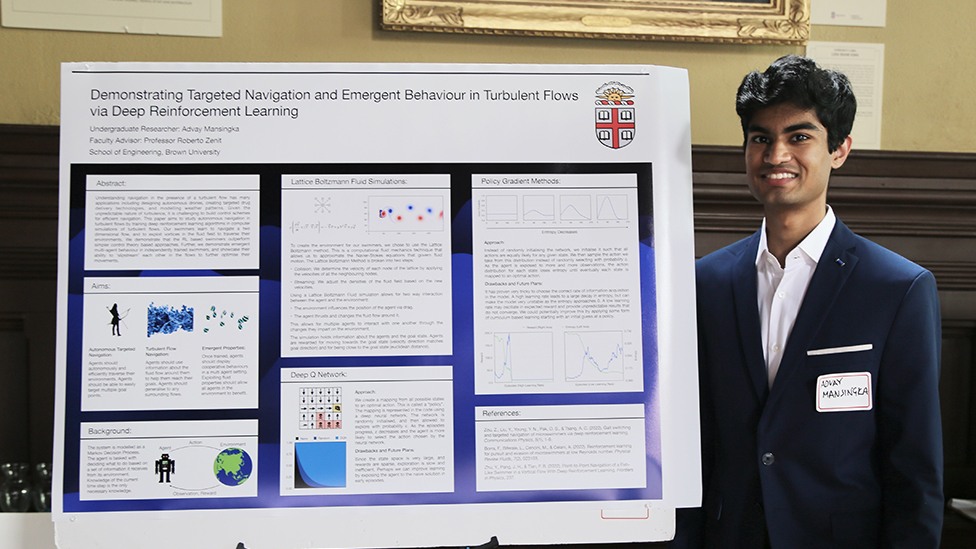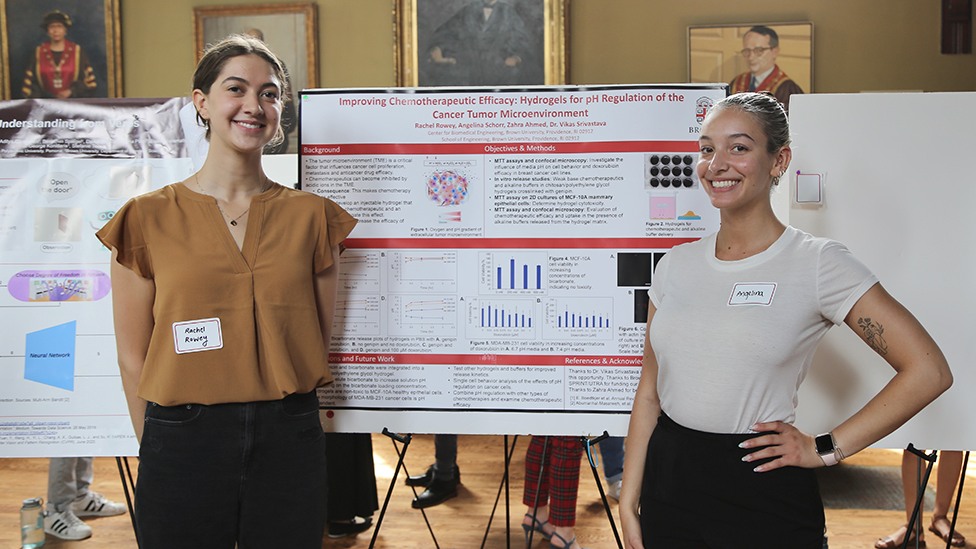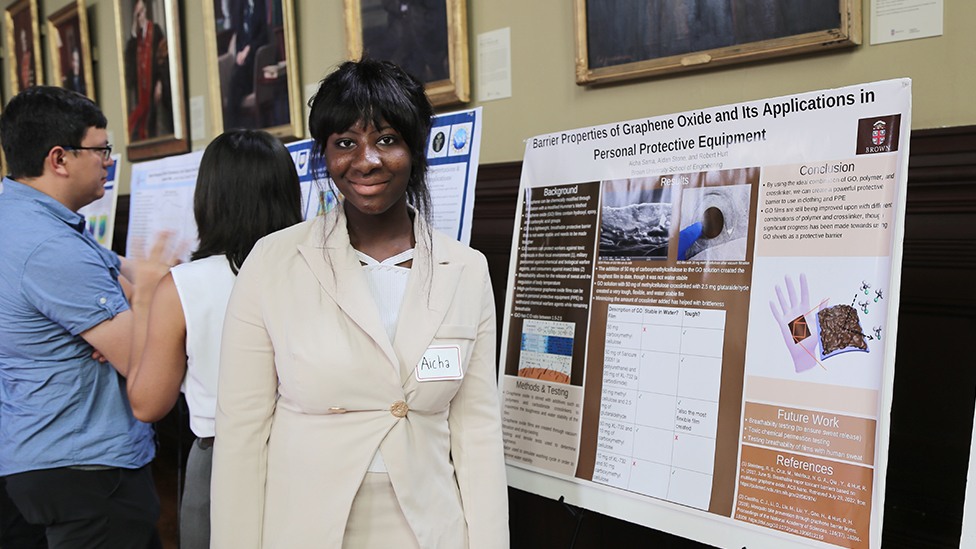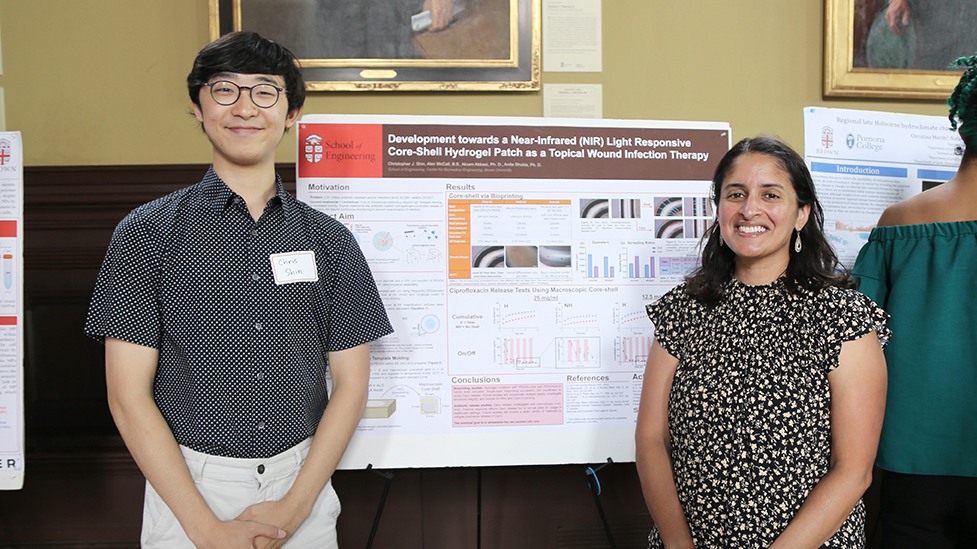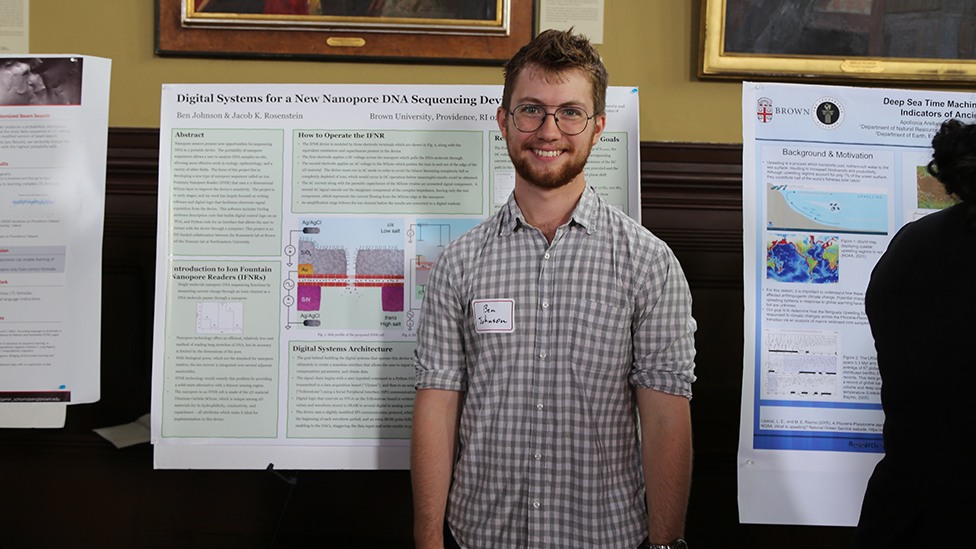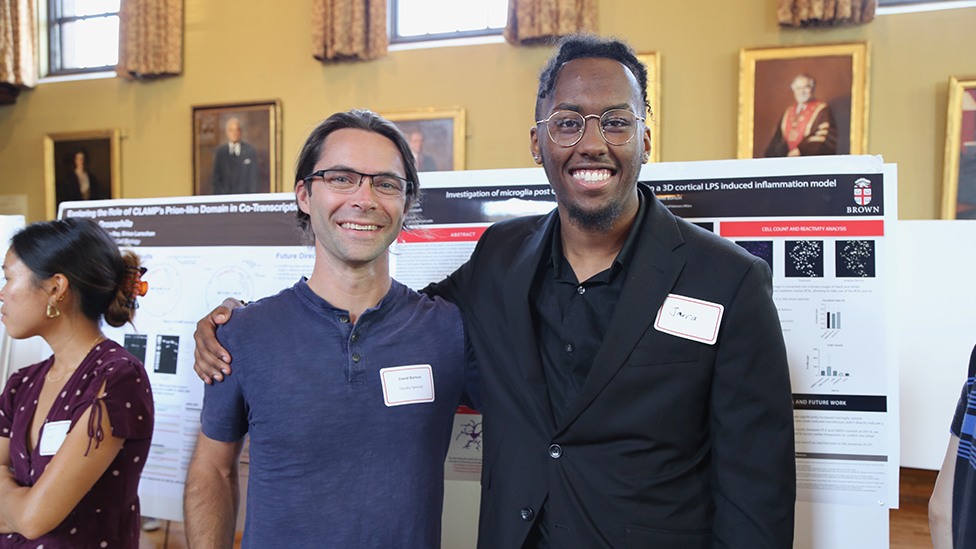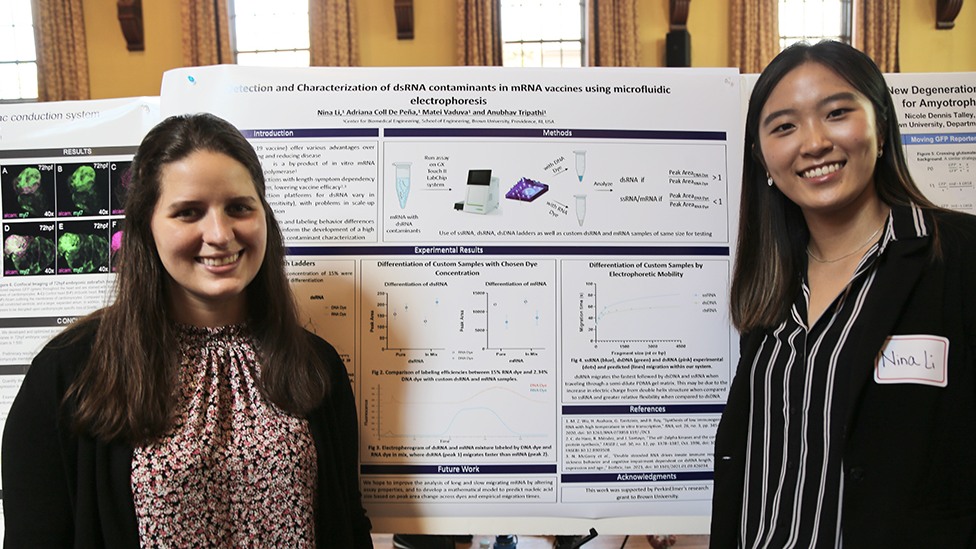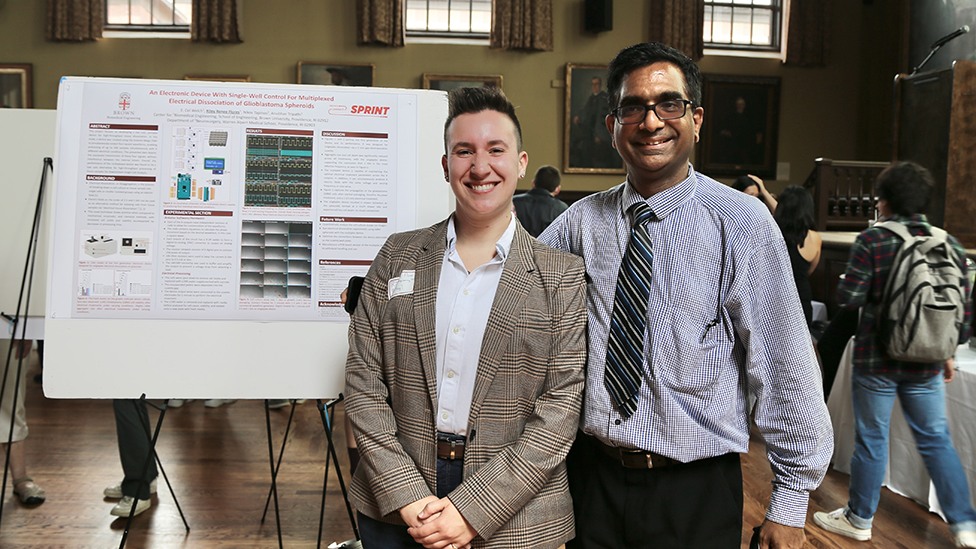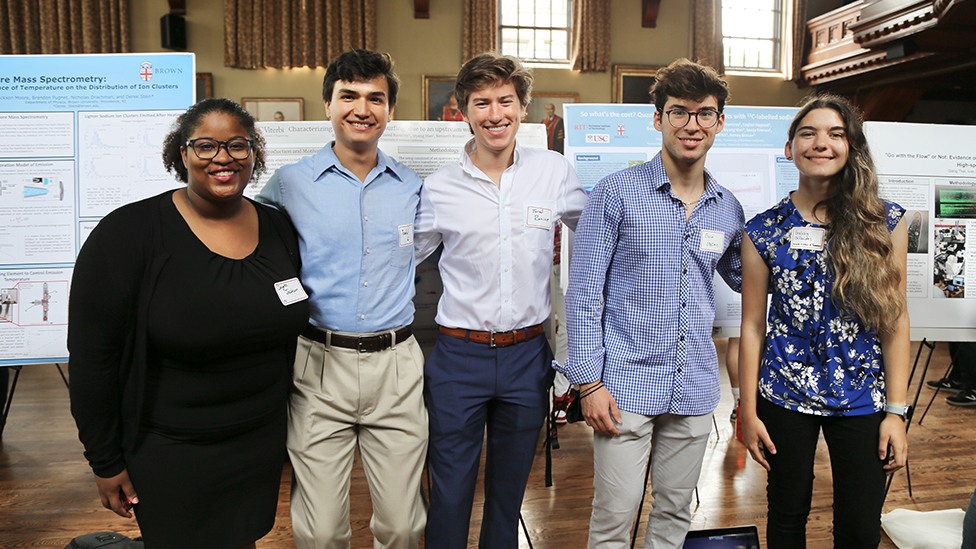“I believe research is a way to apply the theory you learn in class to applications that can have a real world impact,” said Evrim Efe Ozcan ’24. “This is why I spent my summer in Professor (Kenny) Breuer’s lab researching how birds, specifically European starlings, interact with unstable flow conditions during flight in a wind tunnel. Being a biomedical engineer, I hoped this project would be at the crossroads of the two fields my concentration merges. It did push me to rely on my background in fluid mechanics and physiology in order to obtain results on how birds' metabolic energy expenditure relates to different wake structures.” Ozcan’s summer research was one of several larger group projects that brought together undergraduates from multiple universities to study in Providence over the summer.
Ben Johnson ’23, an electrical engineering rising senior, agreed with Ozcan. “My biggest takeaway from this summer has been realizing how different engineering itself is from engineering classes. Engineering classes can be kind of a grind, but the real excitement kicks in when you're given a project that you have to basically start from scratch.”
Engineering student presentations included:
Brendan McMahon ’24 (biomedical engineering) presented a poster titled, “Toward Clinical Translation of the Intelligent Spine Interface Project.” Associate Professor David Borton mentored McMahon, who was supported with an Undergraduate Teaching and Research Award (SPRINT/UTRA).
Carleigh Oberkfell ’24 (biomedical engineering) was supported by an Undergraduate Teaching and Research Award (SPRINT/UTRA) to present her poster “Visualizing Methicillin-Resistant Staphylococcus Aureus (MRSA) Biofilms Using Scanning Electron Microscopy.” Associate Professor Anita Shukla mentored Oberkfell.
“Investigation of Microglia Post CSF1R Inhibitor Treatment in an LPS Induced Inflammation Model in a 3D Cortical Culture,” was the title of Jarra Omar’s ’24 (biomedical engineering, computer science) poster. Omar worked with Associate Professor David Borton and Ph.D. student Sophie Brown, and was supported by an Undergraduate Teaching and Research Award (SPRINT/UTRA).
Nina Li ’24 (biomedical engineering) was mentored by Professor Anubhav Tripathi, and presented the poster “Development of an Electrokinetic Microfluidic Platform for the Detection and Characterization of dsRNA Contaminants in mRNA Vaccines.” She serves as a Research Engineer in the Tripathi Lab.
Advay Mansingka ’23 (engineering, applied math and computer science) was supported by the Sriram Jayakumar '13 Award from the Brown School of Engineering, and mentored by Professor Roberto Zenit, on the poster titled, “Demonstrating Targeted Navigation and Emergent Behavior in Turbulent Flows via Deep Reinforcement Learning.”
Aicha Sama ’24 (chemical engineering) presented the poster, “Barrier Properties of Graphene Oxide and Its Applications in Personal Protective Equipment,” and was supported by Professor Robert Hurt and an Undergraduate Teaching and Research Award (SPRINT/UTRA).
Ben Johnson ‘23 (electrical engineering and music) presented the poster “Digital Systems for a New Nanopore DNA Sequencing Device,” and was supported by Associate Professor Jacob Rosenstein and an Undergraduate Teaching and Research Award (SPRINT/UTRA).
Working with faculty mentor Kareen Coulombe, Caroline Snyder ’24 (biomedical engineering) presented her poster, “Modulating the Mechanics and Structure of Wet-Spun Collagen Fiber Scaffolds for Engineering Cardiac Tissues.” She was supported by an Undergraduate Teaching and Research Award (SPRINT/UTRA).
Christopher Shin ’24 (biomedical engineering) presented the poster, “Development towards a 3D Bioprinted Near-Infrared (NIR) Light Responsive Core-Shell Hydrogel Patch as a Topical Wound Infection Therapy.” Shin did research at the Shukla Laboratory for Designer Biomaterials this summer, and was supported by Associate Professor Anita Shukla.
Connor Macken ’24 (biomedical engineering) used an Undergraduate Teaching and Research Award (SPRINT/UTRA) to investigate “Modeling the Brain and Studying Traumatic Brain Injury.” He was under the tutelage of visiting fellow Timothé Desbordes and Engineering Professor Arto Nurmikko.
Brown’s Evrim Efe Ozcan ’24 (biomedical engineering) and Raul Ayala ’24 (mechanical engineering) teamed up with Leadership Alliance - Summer Research Early Identification Program students Dayna Jackson (Howard University), Caylan Hagood (University of North Carolina), Gabriella Orfanides (Rochester Institute of Technology) and Jared Ramirez (University of Southern California) for the two-poster group project, “To Surf or Not to Surf: Experimental Kinematic Methodology for Bird Wind Tunnel Flight.” The group was advised by Engineering Professor Kenny Breuer and University of North Carolina Biology Professor Ty Hedrick.
Ozcan, Ayala and Ramirez also joined together to share an Undergraduate Teaching and Research Award (SPRINT/UTRA), investigating “Characterizing Forces on a Wing ‘Surfing’ Due to an Upstream Wake Generator.” This project was also mentored by Professor Kenny Breuer.
Rachel Rowey ’24 (biomedical engineering) and Angelina Schorr ’24 (biomedical engineering) were mentored by Assistant Professor Vikas Srivastava, and presented the poster, “Improving Chemotherapeutic Efficacy: Hydrogels for pH Regulation of the Cancer Tumor Microenvironment.” Rowey was supported by an Undergraduate Teaching and Research Award (SPRINT/UTRA), while Schorr used funding from the Neal B. Mitchell ’58 Systems Thinking Project Award.
Riley Flores ’22.5 (biomedical engineering) presented the poster, “An Automated Electronic Device With Single-Well Control For Multiplexed Electrical Dissociation of Tissues.” Flores was supported by Professor Anubhav Tripathi and an Undergraduate Teaching and Research Award (SPRINT/UTRA).
Sabrina Tolppi ’25 (biomedical engineering) was also mentored by Tripathi, and presented “Improved PCR via Liquid Gallium Temperature Zoning.” She served as a Biomedical Engineering Research Assistant in the Tripathi Laboratory over the summer.
Safah Tariq ’23 (biomedical engineering) was an undergraduate research assistant in Professor Vicki Colvin’s Laboratory over the summer. Safah presented the poster, “Testing Nanoparticle-Polymer Conjugates as Crystallization Agents for Multiple Protein Species.”
“Drug-Loaded Liposomal Nanoparticles for Eradication of Candida albicans Infections” was the project of Tobias Meng-Saccoccio ’24 (biomedical engineering). Meng-Saccoccio was advised by Associate Professor Anita Shukla and supported by an Undergraduate Teaching and Research Award (SPRINT/UTRA).
Associate Professor Kareen Coulombe also advised Toluwalope Ogunfowora ’24 (biomedical engineering). Ogunfowora presented “Efficient Differentiation of Human Induced Pluripotent Stem Cells into Cardiac Fibroblasts for use in Donor-Specific Engineered Tissues,” and was supported by an Undergraduate Teaching and Research Award (SPRINT/UTRA).
Clara Tandar ’25 (biomedical engineering) was advised by Associate Professor Eric Darling and graduate student Ryan Dubay. The work was sponsored by the Draper Bioengineering Internship Program, and was titled, “Dethroning Polystyrene: Cell-Like Particles with Tunable Acoustic Properties for Improved Calibration.”
Engineering faculty advised students from other departments with the following presentations:
Austin Roy ’24 (neuroscience) was advised by Professor Diane Hoffman-Kim and supported by an Undergraduate Teaching and Research Award (SPRINT/UTRA) for the poster, “Genetically Encoded Calcium Indicators in a 3D Neuronal Spheroid Model.”
Kyle Lam ’25 (chemistry, computer science) was supported by an Undergraduate Teaching and Research Award (SPRINT/UTRA) and Associate Professor Anita Shukla. He presented the poster, “Characterization of Gelatin Nanoparticles in Biological Matrices.”
Peter Gonzalez ’24 (chemistry) presented the poster “Synthesis and Characterization of Voriconazole Encapsulated PLGA Nanoparticles for Treatment of Aspergillus Infections.” He was advised by Associate Professor Anita Shukla and Ph.D. student Ronnie LaMastro, and was supported by an Undergraduate Teaching and Research Award (SPRINT/UTRA).
Willis Bilderback ’24 (chemistry) presented the Undergraduate Research and Teaching Award (SPRINT/UTRA) sponsored poster, “Kinetics of the Release of Intercalants from Graphene Oxide Nanosheets.” Bilderback was mentored by Professor Robert Hurt.
Engineering professors Kareen Coulombe, Ian Gonsher, Mauro Rodriguez and Anita Shukla also mentored undergraduates from the University of Massachusetts, Arizona State, Howard, Mercer and the University of Puerto Rico on their research posters.
Many of the projects were supported by Brown's Karen T. Romer Undergraduate Teaching and Research Awards (SPRINT/UTRA). Generous support was also provided through several other programs including: Biomedical Engineering Research Assistant; Brown Center for Biomedical Informatics (BCBI) Summer Internship; Caleel Fellowship; Carney Institute Summer Scholars; Draper Laboratories of Cambridge, Mass.; Experimental Program to Stimulate Competitive Research (EPSCoR-NSF); Iris Undergraduate Internship Program; Leadership Alliance-Summer Research Early Identification Program (SR-EIP); Learn Scholarship (Lafayette College); Medical University of South Carolina - Summer Undergraduate Research Program; Neal B. Mitchell ’58 Systems Thinking Project Award; NSF Research Experience for Undergraduates (REU); NSF REU Site: Artificial Intelligence for Computational Creativity; Providence/Boston Center for Aids Research (CFAR); Royce Fellowship; Scale-Aware Sea Ice Project (SASIP); Space Grant/NASA; Sriram Jayakumar ’13 Award; Summer Research Assistantship in Biomedical Sciences; Summer ResearchProgram, Weiss Lab; The Carney Institute for Brain Science; Undergraduate Research Assistantship in MCB; Voss Environmental Fellows; and Weiss Summer Fellowship, RI-INBRE SURF.
